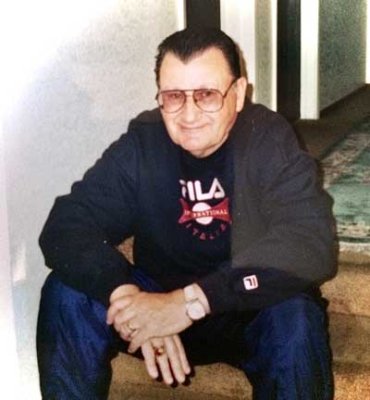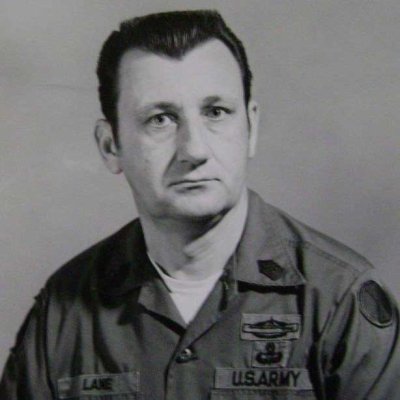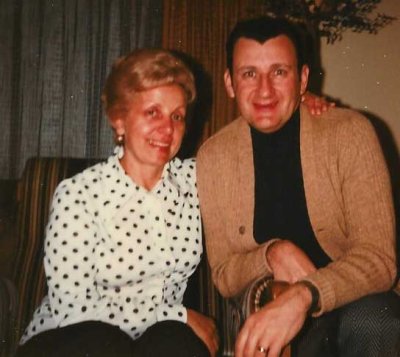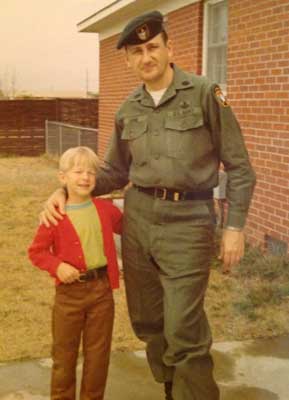Dad Always Seemed Bigger Than Life. But I Had No Idea There Was a Hero in the Next Room.
It felt like a punch in the stomach. For a few seconds, I was breathless, then overcome by anxiety. Finally, a certain calmness took over.
The call came around lunchtime on Feb. 5, 2009, a pleasant, sunny day. I worked as a letter carrier for the U.S. Postal Service and was out delivering mail. Even though I knew my dad was near death, my mom’s words over the phone shocked me in a way I had not experienced before—or have since.

Tom Lane’s father died of esophageal cancer at age 74. Photo courtesy of the author.
My father, Thomas R. Lane, was dead at 74 from esophageal cancer.
A few days later, as I began to write his obituary for our local newspaper, I realized much of his life was a mystery to me. And I wondered how that could be. He was Dad for 44 years. He was my hero. I knew the state where he was born (Pennsylvania) but not the city. I knew the name of his mother, Tillie, whom I met as a child, but not the name of his dad, whom I never met. (Charles, I learned). Two brothers had preceded him in death—Harry and John. He had a sister, Betty, still alive, whom I’d met many times.
When I was a child, my dad told me he’d served in the U.S. Army (Special Forces) from 1951 to 1977, and that shortly after his enlistment, he’d headed to Korea to fight. I knew he’d also served in Vietnam in the mid-1960s, but I didn’t know for how long. As it turned out, he’d served three tours of duty in that war over a four-year period, earning four Bronze Star medals—details my mother filled in for me after Dad was gone.

Tom Lane’s father died of esophageal cancer at age 74. Photo courtesy of the author.
He’d rarely spoken of his time in Korea and Vietnam. When he did, he mentioned friends he’d lost, and a certain melancholy seemed to consume him. He’d struggle to finish the story, often saying that no one should have seen the things he saw in combat.
I could recall, as a young boy of four or five, gathering at a restaurant in or around Fort Bragg, and Dad waiting for a car to pick him up afterward. I hugged him, then ran back into the restaurant, where I waved goodbye from a window. Dad smiled and waved back. This was a story he didn’t mind telling, but I can still remember the sadness I felt at that moment.
Award-Winning Journalism in Your Inbox
I would grow to six-foot-two, same as Dad, but he always seemed taller. Bigger than life. I think all children feel that way about their parents. He came across as an intimidating figure at times, with a rough exterior he developed growing up in a small coal mining town during the Great Depression and World War II. Dad respected straightforward, honest people, and he taught me to be that way. Beneath his toughness, though, was a good sense of humor and a big heart. He showed up to his children’s and grandchildren’s ball games, school events, and graduations. He was quick to volunteer when someone needed something.

Tom Lane’s mom and dad. The older he gets, the more he wishes he had told them what they meant to him. Photo courtesy of the author.
By the time I was a teenager in the 1980s, Dad got a job working for the water company as a building/office inspector—and I got my own TV in my bedroom. It seemed like a dream at the time, but now I look back on those evenings when Dad and I were both home with a different perspective. Dad was often in the living room, watching TV or reading a book or magazine. I was in my room, alone, doing the same.
I didn’t know what I do now—my hero wasn’t a musician or athlete. It was Dad, just down the hallway. A hero in the next room.
During the final years of his life, Dad used to call me two or three times a week, usually around 6:30 p.m., just to chat. We talked about sports, life, maybe a little politics. I miss those calls. I learned more about him in those years than I ever did growing up.
But details of his hard, early life, of his childhood, of his time in the Army, are lost now. I never pried into those memories, and I’m embarrassed that maybe I didn’t know my dad as well as I should have.

Tom Lane and his father before he departed for Vietnam. Photo courtesy of the author.
The day before he died, Dad’s health took a turn for the worse. I went into his room and knew it might be the last time I’d see him alive. Before I left, I told him I loved him.
I don’t remember ever having said those words before, and over the years, I’ve thought about that moment many times. If there’s one thing the Lane family didn’t do enough, it was say, “I love you,” to each other.
Six years after my dad’s death, my mom passed away. My sister died five years ago at age 59. At 58, I find myself struggling to reconcile all of the losses—that out of the four of us, I am the only one still living. That fact gets harder every year.
Time and loss have left me more sentimental, and I frequently reflect on the past. I wonder whether that’s healthy, but the memories are too vivid to let go.
Our Journalism Depends on Your Support
My parents are buried together in a veterans’ cemetery about an hour-and-a-half drive from home. I visit twice a year, in the spring and fall, and it’s tough.
I dream about them often, and it’s here that we’re together again. It’s here that I tell them how much they did for me and my family, how thankful I am to have had them as parents, and how much I love them—words I should have said more of when they were alive.
But I’m saying it now.





Comments are closed.